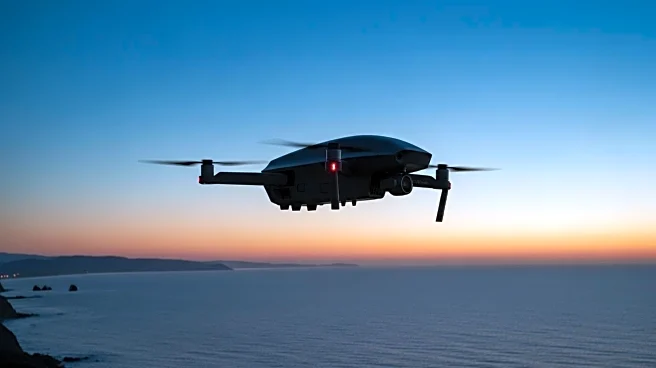What is the story about?
What's Happening?
A U.S. Navy MQ-4C drone was tracked flying near China's coastline, sparking concerns over ongoing military surveillance activities in Northeast Asia. The drone, designed for maritime surveillance, was launched from Okinawa Island, Japan, and flew over the Yellow Sea and East China Sea. This activity is part of the U.S.'s strategic presence in the Western Pacific, aimed at countering China's growing military capabilities. The U.S. Indo-Pacific Command has emphasized the importance of unmanned aircraft for intelligence and reconnaissance in the region. China's Foreign Ministry has criticized these actions, claiming they threaten China's sovereignty and security.
Why It's Important?
The U.S. drone flights near China are significant as they reflect ongoing geopolitical tensions between the two nations. The surveillance activities are part of the U.S.'s strategy to monitor China's military developments, which include nuclear and conventional capabilities. This situation impacts regional security dynamics, with Japan hosting U.S. military assets to deter aggression. The surveillance flights are a point of contention, with China accusing the U.S. of provocative actions. The continued military presence and surveillance could influence diplomatic relations and regional stability, affecting trade and security policies.
What's Next?
The U.S. is expected to continue its surveillance flights near China, using both manned and unmanned aircraft. The potential for military encounters remains, as China has previously conducted intercepts of U.S. aircraft. The situation may lead to diplomatic discussions or further military posturing. Regional allies, such as Japan, may play a role in mediating tensions or supporting U.S. strategies. The ongoing surveillance could also prompt China to enhance its defensive measures or engage in reciprocal actions, impacting future military and diplomatic engagements.
Beyond the Headlines
The surveillance activities highlight broader issues of international law and sovereignty, as the U.S. conducts operations in international airspace. The ethical implications of military surveillance and the balance between national security and regional peace are critical considerations. Long-term, these activities could influence global military strategies and alliances, as nations navigate the complexities of power projection and defense.
















